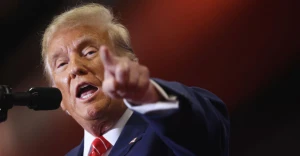
Trump is back. His goal is 'golden age' for the USA, but where does Ukraine fit in it?
Donald Trump has stepped into the White House for the second time, promising peace worldwide—much like the contestants in his former beauty pageants vying for the crown
Donald Trump faces two key challenges in his second term: proving to the world—and to Americans—that the U.S. still holds global dominance and ensuring China doesn’t overstep into its backyard. Additionally, he must deliver on his promises and bring peace somewhere, somehow.
As expected, Trump's stance as a candidate differs greatly from his actions as the 47th president. On his first day in office, he expressed skepticism about the recently brokered ceasefire between Israel and Hamas. “I’m not sure. This isn’t our war; it’s their war,” Trump stated during a Monday briefing.
This serves as a lesson for Ukrainian leaders: any truce with Russia could be short-lived. Now is not the time to put up campaign billboards ahead of elections; otherwise, there might not be elections at all, and those billboards could become targets for public mockery.
"Ending this senseless war in Ukraine" has proven to be a tougher challenge for Trump than simply talking to Putin within 24 hours. Members of Trump’s team, such as Secretary of State Marco Rubio, acknowledge that the U.S. is in for prolonged diplomatic negotiations. The intrigue lies in how Trump plans to leverage the oil and gas stranglehold on Russia, inherited as a legacy of Biden’s severe sanctions.
Trump publicly states that Russia will face significant problems if its leader, Vladimir Putin, refuses to agree to end the war in Ukraine.
"I think Russia is in big trouble. Look at their economy, look at inflation," the U.S. President remarked, adding that most Russians believed the war in Ukraine would end in a week and wouldn't affect them.
It’s crucial to understand how committed Trump is to delivering on his promise of ushering in a golden age for America. During his inaugural speech at the Capital One Arena in Washington, he pledged new advancements and expanded oil and gas production: "We’re going to drill, baby, drill."
"We will lower prices, refill our strategic reserves to the brim, and export American energy worldwide. We will once again be a wealthy nation, and the liquid gold beneath our feet will make it happen," he stated.
If this vision becomes a reality, it’s safe to say Russia will lose its status as a global gas station, with American energy resources flowing generously into Europe. This could be a subtle hint to Putin to end the war in Ukraine now.
However, it’s essential to recognize that Trump and his administration perceive their primary threat not in a weakened Russia on Ukrainian battlefields, but in China. Beijing’s ambitions to win the tech race, build its military strength, and challenge Washington for global dominance remain their primary focus.
Many have shared memes of Mark Zuckerberg eyeing Jeff Bezos’s bride’s neckline while global tech leaders stood in the background—a humorous take on the elite group of individuals aptly termed technocapitalists.
One of Trump’s most intriguing early initiatives is the announcement of Stargate—a joint project by OpenAI, SoftBank, and Oracle aimed at investing up to $500 billion in U.S. artificial intelligence infrastructure. This ambitious plan focuses on building powerful computational centers, modernizing infrastructure, and securing America’s leadership in the global tech race.
The project has two critical goals: creating tens of thousands of jobs to "make America great again" and significantly upgrading the power grid. The state of U.S. infrastructure, often depicted in films where characters fail to find a mobile signal, has proven inadequate to handle the energy demands of AI. Addressing this issue isn’t just vital for domestic progress—it’s a strategic move to curb Beijing’s technological ambitions.
Many in Ukraine believe that Trump has a soft spot for Russia or that the Kremlin holds compromising material on him. However, Trump’s persona is such that scandals often play to his advantage. More likely, he approaches every issue with the mindset of a businessman.
At one of his first press conferences, the press asked Trump if he was ready to impose new sanctions on Russia. His response: "Sounds likely." It’s evident that Trump will call Putin, gauge his attitude and willingness to make concessions, decide who’s the alpha in the situation, and then announce his final decision.
For now, the U.S. doesn’t have a clear strategy on what to do with Russia or how to find a path to peace in Ukraine. That leaves us with one focus—our own work. What does that mean? It means keeping an eye on those undermining our defense, speaking up when capable officials are dismissed from the government, and refusing to stay silent when failures in the war effort are pinned on frontline generals while corruption among allies is overlooked in preparation for elections.
Trump is not Ukraine’s president and doesn’t see ensuring our survival as his responsibility. He’s made it clear that his priority is the U.S., reasserting its global leadership. He will seek strong allies and pragmatic ideas, and whether Ukraine fits into his vision depends entirely on our ability to present our experience and strategy as valuable. In essence, it’s up to us to sell our business plan.
Specially for Espreso
About the author: Maryna Danyliuk-Yarmolaieva, journalist.
The editorial board doesn't always share the opinions expressed by the blog authors.
- In reality, everything Trump did on his first day as president is entirely logical. He's communicating with his voters and the elites who support him.
- News












































